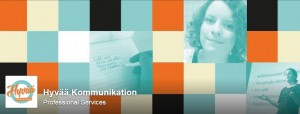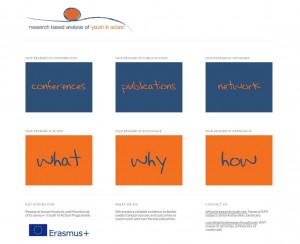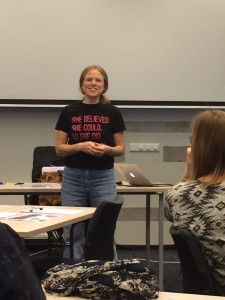Sharing Communication Ideas in Lithuania
The streets of Vilnius are speckled with yellow leaves, the blue sky dappled with hot air balloons. Thirty Communication Officers from across Europe have gathered here to share ideas in the 'Rock Hotel' of Lithuania. We’re breaking into workshops in rooms called 'Imagine', 'Satisfaction' and 'Good Vibrations'. There’s the hum of music along the corridors of the hotel. It all bodes well for an interesting week of lifelong learning!

SALTO-YOUTH Information Resource Centre have organised this Communication and Information Officers Training (CIOST) in collaboration with the Lithuanian National Agency. The programme will touch upon strategic uses of Erasmus+, the benefits of the RAY network’s research for the Youth sector, the importance of inclusive, 'norm creative' representation in communications, and collaborative communication work between national agencies.
Research-based analysis of Erasmus+ Youth in Action
For all of us who have cooperated in European programmes, we know the benefits of 'mobility', of 'travelling', of 'getting out of our comfort zone'. Something changes within us. Our perspectives expand. We grow. We learn. Helmut Fennes from the RAY network gives us data to confirm this. The RAY network’s analysis of the Erasmus+ Youth in Action programme shows that participating in international learning:
- has a profound positive effect on our ‘self-perception’
- engenders solidarity with people from other cultures and diverse backgrounds
- increases tolerance
- increases the participation of young people in society
- develops all the key competences needed, not just for young people but their youth leaders and organisations they represent
- makes the local environment more inclusive
- increases employability.
RAY recommend that youth workers and organisations interested in applying for Erasmus+ funding draw on this data when applying for funding. Find out more at http://www.researchyouth.net/
'Anti-oppressive' and 'norm creative' communication in practice
We all strive to make Erasmus+ as accessible and inviting as possible, and the images we use play an important role in achieving this. The group spends time sharing ways to challenge inequality in visual communication. Maria Niemi of Hyvää Kommunikation in Sweden is passionate about communications that include all kinds of people, called anti-oppressive communication – or as she likes to call it, 'norm creativity'. She recommends that when we are disseminating projects it is important to visually:
- use real and authentic situations
- challenge stereotypes
- think outside the ‘norms’
- show diversity
- pay attention to the arrangement within the image: who is passive and who is active within the image?
- be inclusive
- be consistent.

Collaborative Communication Work
Our trainer during the week, Terese Raymond, explains the benefits of Creative Commons when sourcing imagery. Creative Commons is a non-profit organisation founded in 2001. It provides a copyright service whereby artists, photographers and writers can share their work for others to use. "If you’re looking for content that you can freely and legally use, there is a giant pool of CC-licensed creativity available to you".
An artist can choose if their material can be used for commercial or non-commercial use or if others can modify their image. All that is required from the final user is that you attribute the image to the artist in your publication (using the correct CC license).
You can source Creative Commons imagery via Flickr. Simply search for 'Creative Commons' and choose one of these options from the ‘any license’ drop-down:
- All creative commons
- Commercial use allowed
- Modifications allowed
- Commerical and moderations allowed.
To find out more visit http://creativecommons.org/.

It’s been a wonderful few days in the Lithuanian capital. It’s inspiring to meet colleagues from around Europe and share ideas and practices. I’d like to extend my thanks and appreciation to our trainer Terese, our colleagues in SALTO-YOUTH, the Lithuanian National Agency and all the other national agency colleagues at the training, for this inspiring learning opportunity.
If you have any questions or wish to discuss how you can capture the activities of your projects in inclusive ways, please do not hesitate to contact me at bdesmond@leargas.ie.
We welcome contributions to 'Insights' at comms@leargas.ie.


